
 Could universities be compromising their ethical standards and academic integrity by adopting AI tools without fully addressing the potential risks and moral dilemmas?
Could universities be compromising their ethical standards and academic integrity by adopting AI tools without fully addressing the potential risks and moral dilemmas?
 Research Article: Generative Artificial Intelligence in Higher Education: Why the 'Banning Approach' to Student use is Sometimes Morally Justified. Image Credit: MMD Creative / Shutterstock
Research Article: Generative Artificial Intelligence in Higher Education: Why the 'Banning Approach' to Student use is Sometimes Morally Justified. Image Credit: MMD Creative / Shutterstock
An article recently published in the journal Philosophy & Technology comprehensively explored the implications of generative artificial intelligence (AI) tools in higher education, highlighting debates on their responsible use in academic settings. The author, Karl de Fine Licht of Chalmers University of Technology, Sweden, examined the benefits and drawbacks of integrating generative AI tools, such as chat generative pre-trained transformer (ChatGPT), Gemini, and GitHub Copilot, into university curricula, with a focus on the broader ethical implications, such as student privacy and environmental impact, and emphasized the importance of a balanced, philosophically-grounded approach to AI adoption.
Background
Generative AI tools have transformed interactions with technology by enabling machines to learn from large amounts of data and generate human-like text, code, images, and other content. These tools have rapidly gained popularity due to their potential to assist with research, writing, programming, and problem-solving.
In higher education, they can potentially improve student learning outcomes and enhance academic productivity. However, their use has raised concerns about academic integrity, bias, cost, digital divides, and overreliance on technology. These concerns underscore the need for research on the impact of generative AI on academic integrity, student learning, and the evolving role of educators.
About the Research
The paper presents a detailed analysis of the ethical considerations and practical challenges of using generative AI tools in higher education. The authors used a bottom-up approach to philosophical inquiry, employing reflective equilibrium to balance specific cases with broader ethical principles. They argued that universities could justifiably ban generative AI tools under certain conditions: (a) collective support from faculty, students, and administration after a fair process and (b) limited resources. This argument is grounded in the moral responsibility of universities to avoid participating in processes that may be ethically questionable, such as those that harm the environment or compromise student privacy.
The study highlighted the risks and benefits of these tools and advocated for a "banning approach" in cases where universities lack resources and ethical concerns arise. It emphasized that banning these tools is not just about control but about maintaining academic integrity and upholding the values of higher education.
Key Findings
This work identified several key concerns about the unrestricted use of generative AI tools in higher education. One major ethical concern is the potential for these tools to foster dependency, where students may rely excessively on AI, leading to a degradation of critical thinking skills. It argued that these tools could lead to an overreliance on technology, weaken students' critical thinking skills, and promote superficial engagement with learning materials.
The study also noted the risk of educational inequality, where students with access to advanced AI tools might outperform peers who lack such resources. Additionally, the authors highlighted the significant environmental impact of generative AI, particularly the high energy consumption needed to train large language models (LLMs), and argued that universities have a moral obligation to consider these impacts.
Furthermore, the research acknowledged the potential benefits of generative AI, such as improved learning outcomes and increased productivity. However, it argued these benefits are often overstated and may not outweigh the risks. The paper emphasizes the importance of understanding the broader ethical implications, including the risk of contributing to morally adverse processes, such as data exploitation by AI companies.
While AI tools can be helpful for specific tasks, they can also diminish the quality of student work when overused, as students may rely on AI-generated content without fully understanding the underlying concepts. This reliance can hinder the development of critical thinking skills and the ability to analyze information and synthesize complex ideas.
Applications
The research has important implications for policy and guideline development regarding the use of generative AI tools in higher education. The researchers support a balanced approach that considers both these technologies' potential benefits and risks. They argue that universities should engage in ongoing ethical reflection, taking into account the dynamic nature of real-world problems and the evolving role of AI in society. They suggest that universities focus on creating educational resources and training programs for faculty to ensure the responsible and effective integration of AI tools into the curriculum.
Conclusion
In summary, the study critically examined the implications of generative AI tools in higher education, outlining the potential risks and benefits. While recognizing the potential advantages, the authors argued that, under certain conditions, universities are justified in banning students' use of generative AI tools due to significant ethical concerns, including environmental impact and data privacy. The paper emphasized the need for educators to recognize these tools' biases and limitations and to develop strategies that align with the ethical values of higher education.
Their findings have significant implications for developing boundaries for AI use in higher education and highlight the need for ongoing research into the impact of these technologies on academic integrity, student learning, and the role of educators. Ultimately, the authors call for a more cautious and ethically informed approach to AI integration, prioritizing students' well-being and educational institutions' moral responsibilities.